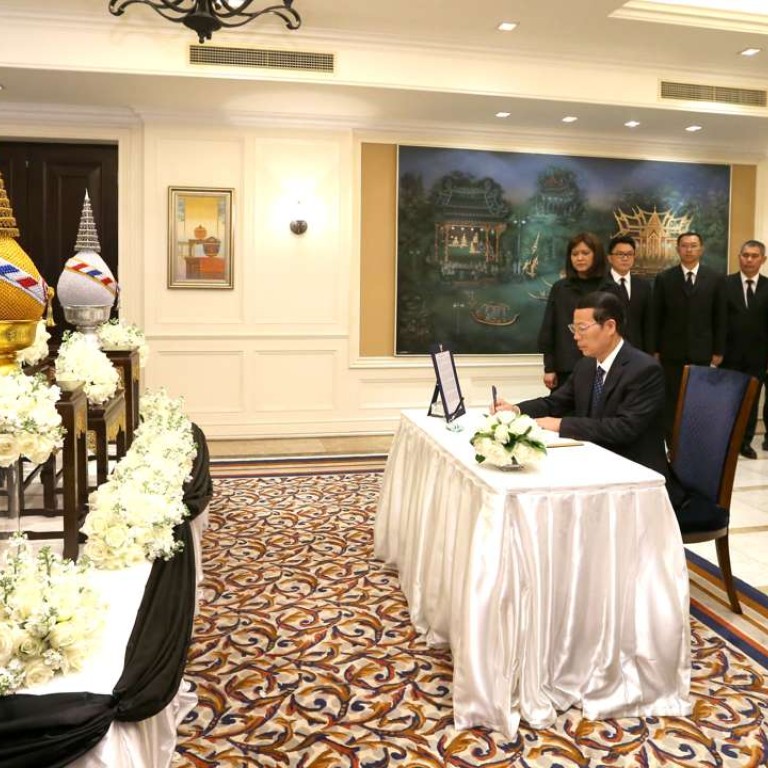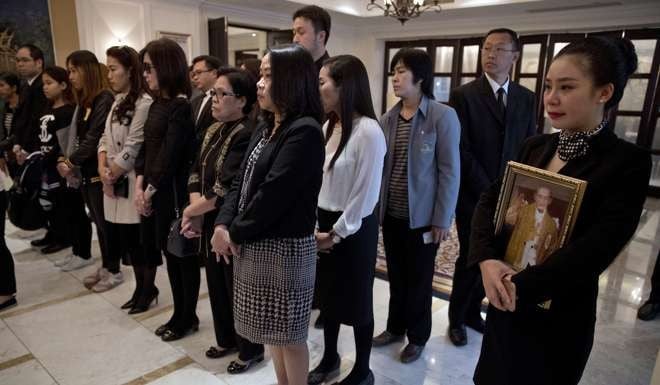
Delays to Chinese deals expected in wake of Thai king’s death
Thailand’s priority now is mourning and overseas projects are set to be postponed, analyst says
Political and economic uncertainties in Thailand with the death of King Bhumibol Adulyadej will add another layer of complexity to the “good but not exceptional” ties between Bangkok and Beijing, an analyst said.
For Beijing, the potential chaos and mourning period after the death of the king and the appointment of a less-popular successor could delay investment and trade deals in Southeast Asia’s second-biggest economy, according to Zhou Fangzhi, a researcher at the Chinese Academy of Social Sciences specialising in China’s strategy in the Asia-Pacific.
Over decades, Thai royal family has forged personal bonds with China’s leaders
To begin with, there could be delays in big projects, such as new rail lines that China is trying desperately to convince Thailand to build, Zhou said.
All [overseas] projects that can be postponed will be postponed, all that can be suspended will be suspended
“All [overseas] projects that can be postponed will be postponed, all that can be suspended will be suspended,” he said.
Zhou said the priority now for the Thai junta government and Thai public would be mourning.
China accounted for 10 per cent of Thailand’s exports and 20 per cent of Thai imports in the first half of this year. It is Thailand’s biggest trading partner and one of every four foreign tourists visiting Thailand is from mainland China.

Chinese investment is also on the rise in Thailand, led by projects such as the Thai-Chinese Rayong Industrial Zone, a China-developed zone for Chinese manufacturers to outsource their production to Thailand. China is also eyeing Thailand as a key piece in its railway network ambitions in Southeast Asia.
China, Thailand stage military air show in sign of warming ties amid Bangkok’s eroding relations with US
But now China might have to wait for the political dust to settle in Thailand, according to Zhang Xuegang, a Southeast Asian expert from China Institutes of Contemporary International Relations.
“Political infighting inevitably leads to low governmental efficiency and, possibly, the abandonment of previous policies, which may negatively affect Chinese investors,” Zhang said.
Nevertheless, economic ties between the two countries could survive the succession, given “a generally friendly atmosphere”, he said.
Traditionally, Thailand was often regarded as pro-US but at the same time Thailand knows that China is an increasingly important partner
Much rests on Thai Princess Maha Chakri Sirindhorn, who speaks Putonghua fluently and is regarded by Beijing as an “old friend”. The princess is the face of the Thai royal house in China but this could shift after Crown Prince Maha Vajiralongkorn takes the throne.
Wang Dehua, a researcher with the Shanghai Institute for International Studies, said there would not be a major impact on Chinese investment in Thailand in the long term.
“Traditionally, Thailand was often regarded as pro-US but at the same time Thailand knows that China is an increasingly important partner,” he said.
Additional reporting by Zhuang Pinghui


